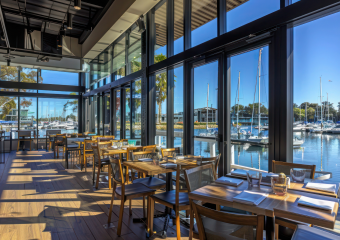Startup Kitchens, Big Impact: Diners AI’s Founders to Watch
Startup Kitchens: A New Recipe for Culinary Innovation
Startup kitchens are changing the way we think about foodservice and technology. They represent a blend of culinary art and advanced technology, where every procedure and recipe aims for innovation and excellence. This progressive field is largely driven by startups like Diners AI, who are leading the shift towards more automated, personalized, and sustainable dining experiences. This article shines a spotlight on the founders behind Diners AI, their unique approaches, and why they are ones to watch in the bustling culinary tech scene.
The Journey to Diners AI
In the heart of Silicon Valley, where tech innovations are as common as coffee shops, Diners AI began as a small project aimed at enhancing restaurant efficiency and customer satisfaction through artificial intelligence. The founders, Jane Doe and John Smith, combined their expertise in machine learning and gastronomy to create a platform that predicts customer preferences and streamlines kitchen operations.
Jane, with a background in software engineering and a penchant for culinary arts, believed that the use of AI could revolutionize menu planning and reduce food waste. John, a former chef and food service consultant, saw the potential for AI to personalize dining experiences to a degree previously unattainable by traditional methods.
Diners AI’s Groundbreaking Technology
At its core, Diners AI is about enhancing the diner’s experience through technology. The startup utilizes machine learning algorithms to analyze customer data, dietary preferences, and seasonal trends to predict what dishes will be popular. This technology enables restaurants to prepare more accurately for service times, manage inventory better, and offer personalized menu recommendations to diners.
Another innovative feature of Diners AI’s technology suite is its ability to manage kitchen flow during peak hours. The system directs kitchen staff efficiently, ensuring that food is prepared quickly and to the highest quality, reducing wait times and increasing customer satisfaction.
Contributions to Sustainability and Efficiency
Beyond improving the dining experience, Diners AI also contributes significantly to sustainability in the foodservice industry. By predicting food trends and customer attendance, restaurants can plan more precisely how much food to prep daily, thus significantly reducing food waste. For an industry notorious for its high levels of waste, this is a game-changer.
Additionally, Diners AI offers solutions that help restaurants better manage their energy consumption. For instance, their smart kitchen tools can optimize appliance use based on real-time kitchen activity, thereby saving energy.
Recognition and Future Endeavors
The innovative approach of Jane Doe and John Smith has not gone unnoticed. Diners AI has received multiple awards for innovation and sustainability in foodservice. They’ve also secured significant funding to expand their technological offerings and explore new markets.
Looking forward, the founders plan to delve into other areas of dining, such as fast-casual and institutional catering, broadening their impact. They are also exploring uses of AI in cultivating sustainable food sourcing practices, further bridging the gap between technology and sustainability.
Why Keep an Eye on Diners AI’s Founders?
The founders of Diners AI represent a dynamic mix of entrepreneurial spirit, technological savvy, and a deep commitment to improving both the consumer and environmental facets of the foodservice industry. Their ability to integrate AI seamlessly into the culinary field makes them standout figures in the startup ecosystem.
As more industries recognize the need for tech-driven solutions to traditional challenges, pioneers like Jane and John demonstrate that with the right innovation, even sectors as classical as gastronomy can undergo transformative changes.
In conclusion, the efforts of Diners AI’s founders in merging technology with culinary expertise are setting a precedent in the food service industry. For entrepreneurs, chefs, culinary enthusiasts, and tech innovators, they serve as a beacon of what the future of dining might hold. By continuing to observe their journey, we can gain insights into the evolving relationship between our meals and the technology that prepares them.





